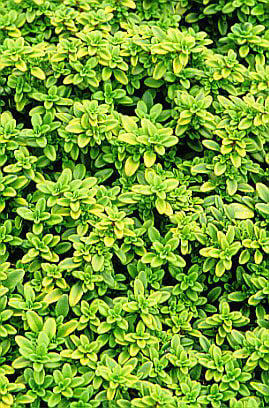Thymus pulegioides 'Bertram Anderson'

broad-leaved thyme 'Bertram Anderson'
A compact, spreading evergreen shrublet to 10cm in height, with aromatic, bright golden-yellow, ovate leaves and terminal clusters of small, pink to pale mauve flowers appearing from May to July. A good choice for edging or for planting as a fragrant lawn. Although not as strongly scented as some varieties, it can still be used in cooking
Synonyms
Thymus 'Anderson's Gold'Thymus 'E.B. Anderson'
see moreThymus citriodorus (Pers.) Schreb. 'Bertram Anderson'
Thymus citriodorus 'Andersons Gold'

Buy this plant
Size
Ultimate height
Up to 10cmTime to ultimate height
5–10 yearsUltimate spread
0.1–0.5 metresGrowing conditions
Moisture
Well–drainedpH
Alkaline, NeutralColour & scent
| Stem | Flower | Foliage | Fruit | |
| Spring | Pink Purple | Gold Yellow | ||
|---|---|---|---|---|
| Summer | Pink Purple | Gold Yellow | ||
| Autumn | Gold Yellow | |||
| Winter | Gold Yellow |
Position
- Full sun
Aspect
South–facing or East–facing
Exposure
Exposed Hardiness
H5Botanical details
- Family
- Lamiaceae
- Native to GB / Ireland
- No
- Foliage
- Evergreen
- Habit
- Matforming
- Genus
Thymus are evergreen woody-based perennials, shrub or sub-shrubs with small aromatic leaves and terminal whorls of small, 2-lipped, tubular, purple, pink or white flowers in late spring or summer
- Name status
Accepted
How to grow
Cultivation
Grow in well-drained, neutral to alkaline soil in full sun. Can be grown in a pot in an alpine house; use a mix of equal parts loam, leaf mould and grit. See Thyme cultivation for further advice
Propagation
Propagate by taking semi-hardwood cuttings in mid to late summer
Suggested planting locations and garden types
- Gravel garden
- Patio and container plants
- Rock garden
- City and courtyard gardens
- Coastal
- Cottage and informal garden
- Wildlife gardens
- Low Maintenance
- Flower borders and beds
Pruning
No pruning required
Pests
Generally pest-free
Diseases
Generally disease-free
Get involved
The Royal Horticultural Society is the UK’s leading gardening charity. We aim to enrich everyone’s life through plants, and make the UK a greener and more beautiful place.